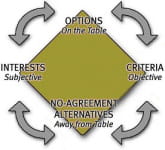Third-Party Agents

This case study discusses how third-party agents can negatively impact our business contracts.
The Role of a Third-Party Agent
Even as negotiation trainers we often use third-party agents to represent our interests in the negotiation process. We use them as we believe that their expertise as negotiators will better serve our goals and achieve better results. Many agents are paid on a commission basis. As a consequence, they can be very concerned about a negotiated outcome. This is because of what they might derive from the negotiation, whether trained or not. Their influence and effectiveness in the outcome also directly relate to the reputation they stand to gain or lose as a negotiator.
Third-Party Agent Case Study
In the late 1980s, in the United States, sports agents Norby Walters and Lloyd Bloom succeeded in persuading approximately 43 athletes to sign contracts. The contracts were presented in a manner to make it appear that the athletes had signed after completing their last year of eligibility and before they turned pro. The governing body, the NCAA, had expressly forbidden players from signing contracts before their last year of eligibility had finished.
To get the players to sign illegally, the agents induced the players by enticing them with:
- Tickets for concerts.
- Airline flights.
- Automobiles.
- Cash payments to the athletes and their families.
- Hotel accommodations.
- Limousines.
- Clothing, and more.
Read What You Sign
This all transpired when the players were in their last year of college, which is the same as the last year of eligibility. The agents had in reality signed these players by using post-dated contracts. Under these circumstances, the agents received exclusive rights to represent the players when they turned pro. The agents constructed the contracts to appear as if the players had signed after the completion of their last eligibility year.
Had the players engaged in the right negotiation training, they may have been able to swerve the contracts that weren’t in their interest. Negotiation trainers often advise reading the small print when it comes to signing any deal.
Voiding the Contracts
Some of the illegally signed players who had signed with these third-party agents tried to void their contracts. The two sports agents proceeded to pressure at least four of the players who wanted to renege on the contract. The agents threatened that they would never play their sport again. As things came to a head, matters began to seep out publicly. People learned that the agents had courted these players during the last year of their eligibility. What’s more, they learned the players signed their contracts before completing their final year of eligibility.
Eventually, the legal authorities charged these two agents when word reached them. The charges included an eight-count indictment for racketeering, conspiracy to commit extortion, and mail fraud, just to name a few.
Additionally, Lloyd Bloom stood accused of defrauding one of the players out of $150,000 by convincing him to invest 1/3 of his signing bonus into a credit business. In truth, it appears that Bloom applied the money to lease a Rolls Royce, pay off some bills, his ex-wife’s rent, and karate classes.
Conflict of Interests
Third-party agents are essential to the business transactions we engage in every day. Most people simply don’t have the expertise to properly and thoroughly engage in some of our transactions and partnerships. However, agents often are privy to more information than one or more of the parties involved in a business negotiation or transaction.
Their interests can sometimes run contrary to our own. So, we must be cautious and on the ball when we subscribe to their specialized knowledge. We need to keep track of what they are doing, or else we run the risk of finding ourselves left behind the eight ball.
YOU MAY ALSO LIKE





I need to become my own third party bonds agent. So I can create place value on and market assets and Equity Bond’s for my corporation.